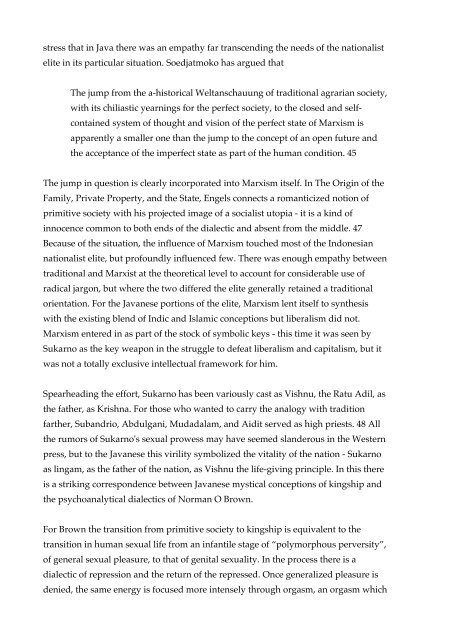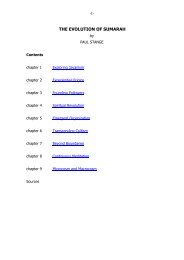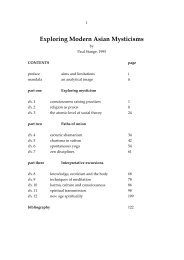Javanese Mystical and Marxist Dialectics - Paul Stange
Javanese Mystical and Marxist Dialectics - Paul Stange
Javanese Mystical and Marxist Dialectics - Paul Stange
You also want an ePaper? Increase the reach of your titles
YUMPU automatically turns print PDFs into web optimized ePapers that Google loves.
stress that in Java there was an empathy far transcending the needs of the nationalistelite in its particular situation. Soedjatmoko has argued thatThe jump from the a-historical Weltanschauung of traditional agrarian society,with its chiliastic yearnings for the perfect society, to the closed <strong>and</strong> selfcontainedsystem of thought <strong>and</strong> vision of the perfect state of Marxism isapparently a smaller one than the jump to the concept of an open future <strong>and</strong>the acceptance of the imperfect state as part of the human condition. 45The jump in question is clearly incorporated into Marxism itself. In The Origin of theFamily, Private Property, <strong>and</strong> the State, Engels connects a romanticized notion ofprimitive society with his projected image of a socialist utopia - it is a kind ofinnocence common to both ends of the dialectic <strong>and</strong> absent from the middle. 47Because of the situation, the influence of Marxism touched most of the Indonesiannationalist elite, but profoundly influenced few. There was enough empathy betweentraditional <strong>and</strong> <strong>Marxist</strong> at the theoretical level to account for considerable use ofradical jargon, but where the two differed the elite generally retained a traditionalorientation. For the <strong>Javanese</strong> portions of the elite, Marxism lent itself to synthesiswith the existing blend of Indic <strong>and</strong> Islamic conceptions but liberalism did not.Marxism entered in as part of the stock of symbolic keys - this time it was seen bySukarno as the key weapon in the struggle to defeat liberalism <strong>and</strong> capitalism, but itwas not a totally exclusive intellectual framework for him.Spearheading the effort, Sukarno has been variously cast as Vishnu, the Ratu Adil, asthe father, as Krishna. For those who wanted to carry the analogy with traditionfarther, Sub<strong>and</strong>rio, Abdulgani, Mudadalam, <strong>and</strong> Aidit served as high priests. 48 Allthe rumors of Sukarno's sexual prowess may have seemed sl<strong>and</strong>erous in the Westernpress, but to the <strong>Javanese</strong> this virility symbolized the vitality of the nation - Sukarnoas lingam, as the father of the nation, as Vishnu the life-giving principle. In this thereis a striking correspondence between <strong>Javanese</strong> mystical conceptions of kingship <strong>and</strong>the psychoanalytical dialectics of Norman O Brown.For Brown the transition from primitive society to kingship is equivalent to thetransition in human sexual life from an infantile stage of “polymorphous perversity”,of general sexual pleasure, to that of genital sexuality. In the process there is adialectic of repression <strong>and</strong> the return of the repressed. Once generalized pleasure isdenied, the same energy is focused more intensely through orgasm, an orgasm which




